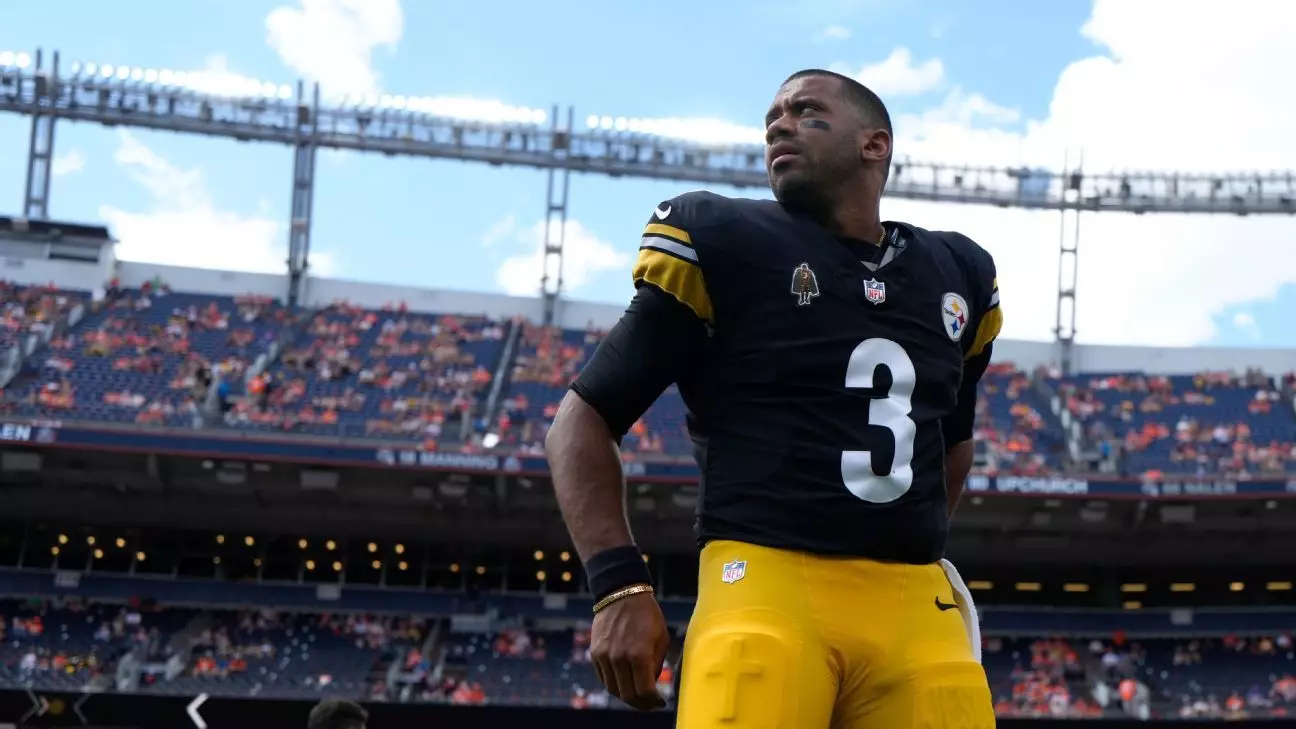In the realm of professional sports, the relationships players develop with their former teammates and organizations can be intricate and multifaceted. Recently, these dynamics were exemplified during the matchup between the Pittsburgh Steelers and the Denver Broncos, where quarterback Russell Wilson didn’t see any action but still managed to become the centerpiece of post-game conversations. The narrative surrounding Wilson’s time with the Broncos, his departure, and the significance of his return offer a compelling lens through which to explore the often-overlooked emotional aspects of competitive sports.
In a league where performance often dictates public perception, Wilson’s journey is particularly notable. Once heralded as one of the premier quarterbacks, his exit from Denver after just two seasons, alongside a hefty contract totaling $242.6 million, left many questioning his capabilities. Coach Mike Tomlin’s decision to award Wilson a “petty game ball” demonstrates a nuanced understanding of loyalty and camaraderie among players. Although Wilson could not contribute on the field due to an aggravated calf injury, his presence on the sideline drew attention and respect. As quarterback Justin Fields articulated post-game, getting a win for Wilson was more than just a statistic; it signified an acknowledgment of Wilson’s past struggles and the turbulence that marked his final days as a Bronco.
Tomlin’s concept of the “petty game ball” adds a layer of intrigue to the narrative. This form of reward serves not only as recognition for individual efforts but as a statement of unity within the team, especially towards those who have endured challenging transitions. Both Brandon Johnson and Corliss Waitman, who played for the Broncos and now serve vital roles in the Steelers’ lineup, received similar accolades. This practice highlights a culture of resilience and the ability to overcome past adversities, turning personal challenges into collective triumphs. Thus, the act of presenting a game ball captures the essence of sportsmanship in a competitive landscape where egos often collide.
On the day of the game, Wilson’s lengthy warm-up session in the familiar surroundings of Mile High Stadium was symbolic. His interactions with former teammates and coaches not only lent a nostalgic ambiance to the moment but also underscored the human side of the game. Unlike the cold professionalism often depicted in the media, Wilson’s heartfelt exchanges with the Broncos’ staff were a poignant reminder that behind the helmets and pads are individuals with shared histories and relationships. This nuanced portrayal of Wilson suggests that emotions often transcend the competitive spirit of the game, revealing the bonds that endure even amidst rivalry.
Even without Wilson’s involvement on the field, Fields’ performance as the starting quarterback was paramount. Despite showing promise with an early success — completing 10 of 12 passes for over 100 yards and a touchdown — the game revealed the challenges inherent in a young player’s development. Fields faced an uphill battle against penalties and a lack of coherence in the Steelers’ offensive execution. His reflections on the difficulty of winning, particularly in hostile environments, emphasize the unpredictable nature of the NFL, where moments of brilliance can be quickly stifled by lapses in teamwork and strategy. This aspect of the game further serves as a rehearsal for future success, illustrating how challenges are often stepping stones to personal growth within the league.
Russell Wilson’s transition away from the Broncos and into a new chapter with the Steelers provides invaluable insights into the emotional landscape of professional sports. The notion of a game ball celebrating past teammates reflects a deeper connection that often contradicts the public narratives of rivalry and competition. As athletes like Wilson and Fields navigate these relationships and face both personal and collective challenges, the broader implications for their careers and their teams become clear: success is not solely judged on wins and losses but on the resilience, relationships, and growth that accompany each moment on and off the field. As teams forge ahead, these stories of redemption and camaraderie will continue to resonate with fans and future generations of players, reminding them that the spirit of the game is as much about unity as it is about competition.

Leave a Reply